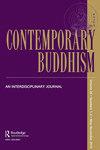A Chinese Buddhist Ecological Narrative: From the Pure Land to the “Beautiful Country” of Xi Jinping
IF 0.1
3区 哲学
0 PHILOSOPHY
引用次数: 0
Abstract
ABSTRACT The practice of adapting discourse to cultural and political circumstances is a recurring theme in Buddhist history in China. Today, as for all the religious institutions in China, Buddhism must respond to Chinese government ideology, including the official call to improve environmental conditions in the country. The Chinese Buddhist Association takes its discourse from the ecological adaptation or interpretation of Buddhist modernism, especially from “Humanistic Buddhism,” and also incorporates political rhetoric. As Buddhism is one of the most influential and widespread religions in Chinese society, it is possible to find different Buddhist ecological narratives. Nevertheless, current developments of the government with the new constitution shifting interpretations of Chinese socialism are eroding the spiritual aspects of Buddhist ecological discourse.使话语适应文化和政治环境的实践是中国佛教史上反复出现的主题。今天,对于中国的所有宗教机构来说,佛教必须响应中国政府的意识形态,包括改善中国环境条件的官方呼吁。中国佛教协会的话语来源于对佛教现代主义,特别是“人文佛教”的生态适应或阐释,同时也融入了政治修辞。佛教是中国社会中最具影响力和最广泛的宗教之一,因此可以找到不同的佛教生态叙事。尽管如此,随着新宪法对中国社会主义解释的转变,政府目前的发展正在侵蚀佛教生态话语的精神层面。
本文章由计算机程序翻译,如有差异,请以英文原文为准。
求助全文
约1分钟内获得全文
求助全文

 求助内容:
求助内容: 应助结果提醒方式:
应助结果提醒方式:


